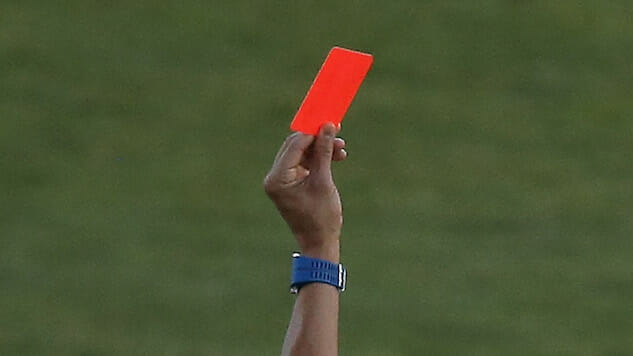People of different races receive varying treatment, whether conscious or subconscious, in areas as diverse as prison sentencing, school discipline, and tipping. It appears this varying treatment also extends to the on-field actions of MLS players. This conclusion of varying player treatment by race comes from a review of 2016 regular season fouls and disciplinary data from the MLS website. The MLS 2016 regular season data shows black players were 14% more likely to be called for fouls than their non-black counterparts. The higher incidence of fouls conceded takes into account minutes played and was consistent for defenders, midfielders, and forwards.
Black players were also more than twice as likely as their non-black counterparts to receive a red card ejection. An ongoing imbalance like this would put black players at a competitive disadvantage in MLS solely on the basis of their race.
The fouls analysis includes players who played at least 680 minutes during the 2016 MLS regular season (20 minutes per game over the 34 game season). Limiting the player pool to those meeting this minimum threshold was done to ensure player familiarity with how games are officiated by MLS referees. Players were designated as either black or non-black by reviewing photographs, based on the assumption that it is the visual appearance of the player that would be relevant for any potential bias regarding racial identification. The player’s field position was determined by their listing from the MLS Players Union. In cases where the union’s data listed multiple positions, the first position listed was used. Goalkeepers were ignored due to their low incidence of fouls.
This approach has obvious limitations. Reducing the complex topic of race to a binary “black or non-black” distinction is in some ways archaic and glides past innumerable other factors, particularly for a league with a sizable Hispanic player pool. Even the less thorny notion of field position isn’t simple. Sacha Kljestan and Ricardo Clark are both classified as midfielders, but no one who has seen them play would claim they have the same on-field role.
And yet acknowledging these limitations, black players in MLS are consistently penalized in excess of what would be expected.
The 14% higher rate of overall fouls called on black players actually understates the racial difference. Defenders in MLS commit fewer fouls than other positions (1.09 defender fouls per 90 minutes for black players versus an average of 1.31 across all positions for black players; 0.97 defender fouls per 90 minutes for non-black players versus an average of 1.15 across all positions for non-black players), and in MLS, black players are more likely to be defenders (40% of the qualifying black MLS players are listed as defenders, versus 35% of non-black MLS players). This means that a disproportionate number of black MLS players are in the “low foul” position of defender. The disparity in fouls conceded by race would be even larger if black and non-black players were more evenly distributed across positions.
Racial differences influencing MLS referees in the 2016 regular season appeared to be even more pronounced with ejections. While MLS referees did not issue yellow cards to black players at a meaningfully higher rate than their white counterparts, red cards were a different story.
Approximately 40% of MLS players are black, yet these players received 58% of red cards issued during the 2016 regular season. On a per-player basis, ejections for black players occurred more than twice as often as for non-black players. If the issuance of red cards was truly unrelated to race, we would expect these extreme results about once every 1000 seasons.
The conclusions are grim. They suggest black players are punished at disproportionate rates by MLS referees with regard to both fouls called and ejections. If this data proves consistent over time, and assuming all other aspects of player performance are equal, it would be rational for MLS teams to take the drastic and disheartening step of deliberately selecting non-black players over black players. Such a dire situation would obviously undermine the competitive validity of the league.
It is possible that these 2016 MLS results for fouls and red cards, while extreme, were simply random variation. It is also possible that black players somehow receive different training from an early age and face different expectations from coaches on the physicality of their play, which could lead to higher foul counts and ejections. The odds of fundamentally different black player training are mitigated, however, by the extremely diverse development path of players in MLS, who come from dozens of countries and myriad backgrounds. Finally, it is highly unlikely that MLS referees are being intentionally unfair in their officiating. The most plausible explanation for the disproportionate sanctioning is, as with many other aspects of society, an implicit racial bias.
Assuming the league is not already taking such steps, ways for MLS to address this implicit racial bias include: making referees aware of the existence of bias, tracking the race of players sanctioned by individual referees and sharing that data internally, and working to have the racial composition of officiating crews reflect that of MLS players.
In many ways MLS is a diversity leader among North American sports leagues. As mentioned previously, players come from dozens of countries. The league has television and radio broadcasts in Spanish and a sizable Hispanic fan base. And while the league has received sustained criticism regarding its marketing outreach and refereeing quality, MLS continues to expand and improve.
MLS would certainly not be the first organization to face the issue of implicit racial bias, either among sports leagues or in society at large. The question is: if the MLS data shows a sustained problem, how will the league act to fix it?

